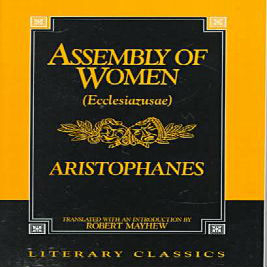
The clever and practical Praxagora has a vision for a new government in the city of Athens, and she has a cunning plan to make it a reality. She convinces the women of the city to disguise themselves as men to infiltrate the citizens’ Assembly, and pass a motion that puts women in charge of the government. The scheme works, and Praxagora and the women set about turning Athens into a socialist utopia, where everything - from personal property to food and even sex - is equitably distributed. The men are skeptical at first, but are soon won over by the new laws, and only those who selfishly resist the new “dictatorship” of women are left in the lurch.
Aristophanes’ comedy about a government run by women appears light-hearted to modern audiences, but was scathing political satire at the time of its composition. The complete reversal of gender roles - and the male characters’ passive acceptance of such a reversal - would have been viewed as a criticism of overly diplomatic government practices in ancient Greece. Aristophanes’ distaste for “effeminate” governance was a topic which he explored in several of his works, such as Lysistrata.
The Assembly of Women guide sections